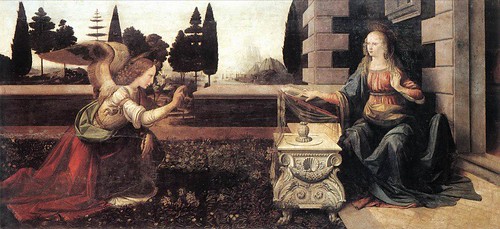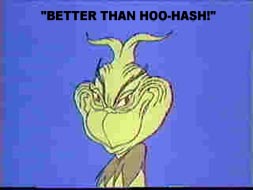JM, in his comment on the post below, has asked me to expand on my comment on the state of contemporary art. This may not be an expansion, but it may be at least a crystallizing of what could have been a moment of brilliance, or alternatively, total balderdash (to deploy an under-used word).
First of all, I think I need to clarify the premises of that post and what I perceive to be the premises of contemporary or postmodern art. It all goes back to modernism: Modern art is based--I think, and I grant that these could probably be further enumerated--on two assumptions, and of course, they are probably interconnected. The first of them is the strong historical sense with which modern art perceives itself. The notion that there can be "avant-garde" or "advanced" art stems from the belief that history unfolds not only linearly but with a purpose. This purpose is typically revolutionary, e.g. it seeks to overthrow the old order and set up a new one. The second assumption is that the out of the world can be elucidated essences of meaning or being. The revolutionary character of modernism is, to my mind, an outgrowth of the desire to uncover the essential order. The reigning order is seen to be corrupt, flacid, and decadent; too far removed from the primary meaning or purpose of life, it cannot be reconciled to the needs of society and must be discarded. I don't want to get too much into the sources of these assumptions. Let it suffice to say that a lot of it is rooted in the 19th century and that a lot of it has to do with Hegel.
But given these two underlying ideas--historical sense and the search for essences--we can comprehend much of modern art. If we take Abstract Expressionism, for instance, we can find these two notions everywhere. On the one hand, stylistically, there is the need to push the boundaries or envelope of technique, praxis, into where it has not gone before. There is a powerful need to do something "new" because art is understood as a historical progression towards an undisclosed end point, but that that progression has been interpreted by art historians as a series of technical inventions in art media called styles. [I ought to take out the tautology of the last two sentences, but I will leave it because it may illustrate something which at this moment eludes me.] So novelty for its own sake, regardless of what that novelty is, can be revered as artistic innovation or advance. I think that Duchamp understood this pretty clearly and his ready-mades are a prescient skewering of that novelty-for-its-own-sake attitude.
But in another sense, Abstract Expressionism was also after uncovering or revealing or making manifest some essential truth of the universe. For Jackson Pollock, this seemed to be the Jungian Collective Unconscious, which he ultimately depicted as a miasma or cloud of the primordial psychological state out of which consciousness arises. Or, we have the essentialism of Clement Greenberg, defender and critic of AbEx who believed that they were reducing painting down to its fundamental components--paint on canvas--and had therefore jettisoned any extraneous referential matter.
Postmodernism attacks these two modernist positions. It attacks, on the one hand, the historical notion by saying that there is no historical will (a zeitgeist, for instance) inexorably and impersonally fulfilling its intentions over time. In other words, history has no end goal; there is only events taking place in space and time. It also rejects the notion of essences. Things do not have any primary state of being, they only have their accidental appearance in the world, the accidences of which are contingent on space and time and therefore also changing. It rejects modernism's belief in an existential ground of being partially because it is (I guess) unprovable--or rather, because it is based on preconceived notions of how things are/ought to be rather than on lived experience; and also because such notions as essences and historicity are believed to be chauvanistic--they tend to privilege and lionize and then mythologize the time and place of the people who have conceived of the category of modern art--when in fact modern art is only one category of art among many, and in fact art itself is only one category among many kinds of equally possible human activity.
We call it postmodernism, however, because it preserves the language of modernism, abstraction or non-representationalism, in order to parody or expose modernisms assumptions. The line between them is never clear. There are some kinds of art (such as Duchamp) which seem very postmodern, and yet came long before postmodernisms formulation, while there are certain kinds of art which have been made since postmodernism which seem modernist in conception.
So what was the moment of clarity? Precisely (I hope) this: that postmodern or contemporary art has taken up a purely critical position in the world today. It has used the reductionism (or essentialism) of modernism to exlude from itself all traditional modes of artistic production--such as oil painting, unless it can do so with exteme irony--in order to isolate its critique. Furthermore, its critique has expanded beyond the bounds of mere modernism to encompass all modes of visual production--movies, pop culture, television, etc. Because it has excluded artistic production, there are very few fine artists who are equipped with what is conventionally called "talent" or "skill" because such things are irrelevant to their taking up a critical position, and, probably, would be inhibitory.
And I mean critique in its least productive sense. Postmodern art--in this context--is primarily a negation, a cancelling out. It is cynical, snide, self-aggrandizing and bland all at the same time. But I think that often it is those things on purpose. No, I am sure it is those things on purpose. Perhaps postmodern artists believe that in the context of the gallery a double negation can occur where the original banal snideness of their work is transformed into a positive affirmation of a certain world-view. But I am not so sure.
So when I said that postmodernism takes place after the end of history I wanted to suggest that it does so after the collapse of the modernist historical urge, but also in a way that sustains that historical sense within it. Postmodernism seems accutely aware of its post-historicity, which itself is a kind of historical sense of self and one that sustains its increasingly esoteric and irrelevant avant-garde identity.
But there are some serious problems with all this. First of all, I have lumped a number of artists of different stripes together while not identifying any of them or justifying my assertions with any one in particular even. A lot of this would probably deflate when contextualized with a real person.
Secondly, I purport to have a solution. My solution would be that art, to reinvigorate itself must transcend all historical notions and work for an end outside of any purely artistic goal. I imagine medieval icon painters painting not with the end of virtuoso paint application but with producing a representation of something they know is unrepresentable: the Divine. But within that, it seems, art is able to become a position of extreme humility; its insufficiency bound up with its purpose and made part of that purpose, in much the same way that we human beings serve some unknown and mysterious Divine purpose, or as weak vessels serve a known purpose insufficiently.
I say purport to have a solution, because my solution as I have conceived it is--however ideal--escapism. Barring a cataclysm of universal proportions, it is not possible anymore to detach ourselves from the historical fabric which we have constructed for ourselves. What will happen, only time will tell.





